| |
|
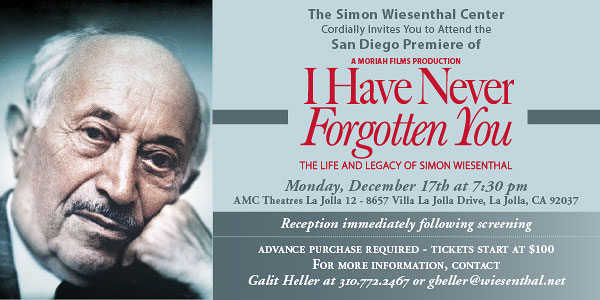
THANKSGIVING ESSAY
'What could now sustain them but
the spirit of G-D and His grace?'
By Sheila Orysiek
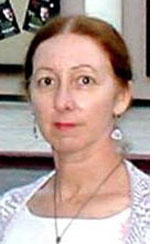 SAN DIEGO—Answering the call to worship G-D as they believed G-D wished them to do; they braved the wrath of their Pharaoh King, gathered their strength in their faith and left the country to cross a sea into a wilderness. The forbidding prospect before them was clouded with danger, but they had no doubt they had to brave it. They could not go back. SAN DIEGO—Answering the call to worship G-D as they believed G-D wished them to do; they braved the wrath of their Pharaoh King, gathered their strength in their faith and left the country to cross a sea into a wilderness. The forbidding prospect before them was clouded with danger, but they had no doubt they had to brave it. They could not go back.
They perceived themselves as the spiritual descendants of the Old Testament Israelites, a Chosen People, Abraham’s Children, obeying G-D, a people with a Covenant. They saw others not within their close knit group as “strangers,” they called themselves “saints” and we call them Puritans.
When James the First came to the British throne in 1603 the last hope of the Puritans for religious freedom in England died and many of them fled to Holland for safety. Though they found religious freedom, they suffered
Sheila Orysiek
economic deprivation as well as the prospect of cultural assimilation and therefore determined to cast themselves upon the mercy of G-D, cross a dangerous ocean and seek a Promised Land. The idea that they were the religious inheritors of the Sinai Covenant was so pervasive in early America that over a century later Benjamin Franklin, John Adams and Thomas Jefferson suggested the Great Seal of the United States depict Moses leading the Israelites through the Red Sea.
Heavily steeped and believing literally in the Old as well as the New Testament, the Puritans thought the parallels between themselves and the Israelites leaving Egypt, crossing the Sea and entering a Wilderness to worship G-D as no accident, but a distinct revelation. Their beloved pastor, John Robinson, was unable to accompany them much as Moses had been unable to accompany the tribes of Israel. Many of them had Hebrew names or names of characteristics they deemed worthy such as: Prudence, Forbearance, Mercy, Hope, Charity, Faith, Humility, Love, and Remember. Many of the towns they founded have names such as New Canaan, New Providence and New Ark. They believed that the Native American people they encountered were descended from the Ten Lost Tribes of Israel.
As they lined the rail of the Mayflower and looked at the desolate shore before them, it was already winter: Christmas Day, 1620. Their hearts sank and one woman cast herself overboard, a suicide of despair. William Bradford, the Governor for many years, kept a Journal which is the only primary source we have of the seminal event of the Pilgrims landing in what became New England.
All of the Puritans were Pilgrims, but not all of the Pilgrims were Puritans. There were forty-four Puritans out of a company of approximately one hundred and ten (historians differ on the exact number). The two groups had many disagreements but tried to structure a means to live together under an agreement called the Mayflower Compact. That first year was devastating and half of them died. Surviving adults took in orphaned children, widows and widowers married and formed new family units.
The land was rocky, not easily farmed and without animal labor such as oxen and horses, every rock and tree stump became a challenge. Winters were harsh and came early. The native population was not plentiful; an epidemic coming from the south had decimated many Indian villages. However, had it not been for those Indians who lived in the area, the Pilgrims would not have survived. Most of the Puritans had been shopkeepers and craftsmen, rather than farmers and many of the rest of the Pilgrims were opportunists seeking easy fortune.
The entire group was indentured to serve seven years with any profits going to the joint stock company of Merchant Adventurers who had financed the undertaking. At first the Pilgrims set themselves up on the economic basis of a commune, but this had the deleterious effect of leveling down the labor of the group to the benefit of the lazy and was changed after the first couple of years to a more capitalist approach of reaping what one sowed.
As they harvested in the fall of that first terrifying year they sat down to celebrate including the Indians who had befriended them. Some historians believe that they modeled that outdoor harvest celebration on Sukkot – also a celebration of harvest and deliverance in a wilderness.
The learned among them assiduously studied Hebrew and considered making it their common spoken language. When Harvard was founded in 1636; a mere sixteen years after the Puritans landed at Plymouth, Hebrew was part of the mandatory curriculum. In fact, all ten of the colleges established before the American Revolution included instruction in Hebrew. Gov. William Bradford stated that he studied Hebrew so that when he died he would be able to speak the "most ancient language, the Holy Tongue in which G-D and, the angels, spake." They considered making Biblical Law the standard for the Plymouth Plantation and the Massachusetts Bay Colony in place of English Common Law.
On a dusty shelf in a used book store in downtown San Diego I found a copy of William Bradford’s Journal and fascinated I read his words, looked at that desolate winter shore through his eyes, lived through their sorrows and rejoiced at their success. The story of the Journal itself is intriguing - somehow ending up as the property of the Bishop of London and subsequently was returned to the United States as a gift to our country for the centennial celebrations of 1876.
As we walk into our local supermarket and wander its aisles, we have spread before us the bounty of the world – we have only to choose. It was twenty years before anything resembling a store would appear in Plymouth Plantation.
Here is how that bleak forested shore looked through the eyes of William Bradford as he wrote it in his Journal:
“Being thus arrived in a good harbor and brought safe to land, they fell upon their knees and blessed the G-D of heaven, who had brought them over the vast and furious ocean, and delivered them from all the perils and miseries thereof, again to set their feet upon the firm and stable earth, their proper element.
But here I cannot but stay and make a pause, and stand half amazed at this poor people's present condition, and so I think will the reader too, when he well considers the same. Being thus passed the vast ocean, and a sea of troubles before in their preparations, they had not friends to welcome them, nor inns to entertain or refresh their weather beaten bodies, no houses or much less towns to repair too, to seek for help.
And for the season, it was winter and they that know the winters of the country know them to be sharp and violent and subject to cruel and fierce storms, dangerous to travel to known places, much more to search an unknown coast. Besides, what could they see but a hideous and desolate wilderness, full of wild beasts and wild men? And what multitude there might be of these beasts they knew not. Nether could they, as it were, go up to the top of a hill to view from this wilderness a more goodly country to feed their hopes; for which way soever they turned their eyes (save upward to the heavens) they could have little solace or content in respect of any outward objects. For summer being done, all things stand upon them with a weather beaten face; and the whole country full of woods and thickets, represented a wild and savage view. If they looked behind them, there was the mighty ocean which they had passed, and was now as a main bar and gulf to separate them from all the civil parts of the world. What could now sustain them but the spirit of G-D and his grace?”
That’s a question still worthy of our consideration this Thanksgiving.
Orysiek is a San Diego-based arts writer and political commentator



Jewish knowledge and information on the web: can it be indexed for researchers?
By Peter Garas
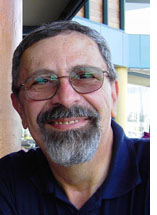 CANBERRA, Australia—Ten years ago, Irving Green, then the publisher of ScanRom Publications as well as the editor and publisher of The First Electronic Jewish Bookshelf, got the idea of finding and publishing the locations of some 500 web sites. CANBERRA, Australia—Ten years ago, Irving Green, then the publisher of ScanRom Publications as well as the editor and publisher of The First Electronic Jewish Bookshelf, got the idea of finding and publishing the locations of some 500 web sites.
His publicists at the time described the contents of the book published by MIS-Press Inc. in the following way:- "This book unlocks the door to using a new medium - the World Wide Web, to explore the writings, sights and sounds of the vast theological and cultural heritage of the Jewish people and to bring the diverse branches of this community together."
Reading this book ten years later, it seems almost quaint and antiquated,
Peter Garas
given the latest search engines that exist. Search engines that even in the hands of children can find virtually anything far more quickly than finding, buying and reading a 366-page book.
The world certainly has moved on!
Nevertheless, Green presented something of enduring value to the reader in identifying and covering five major topic areas: The Jewish World; The Jewish Year; Culture; Intellectual Life and Current Issues
Each major topic area then were subdivided into Chapters that actually refined the contents to more specific areas within these major topics. For example, The Jewish World was split into:Jewish History; The World Wide Web in Israel; Communities; Major Denominations within Judaism; Chabad; Anti-Semitism and the Holocaust; Genealogy, and Major Jewish Organisations
The Jewish Year was divided among The Calendar; The Jewish Holidays; The Sabbath and Food and Wine.
Jewish Culture was divided into Museums and Archives; Music; Art; and Yiddish.
Jewish Intellectual Life was categorised into Classes and Commentary; Higher Education; Books; Newspapers and Magazines, and News.
Finally, Current Issues in Judaism was divided into Jewish Medical Ethics; Divorce and Domestic Abuse; and Feminism.
Whatever you may think about the limitations of the content and the categorisation contained in the book, this work certainly represents (at least to this relatively uninformed reader) a very early attempt to bring to the attention of the community at large a neat and compact way of categorising search criteria that could lead the then brave and intrepid explorer of the Internet into what was (I suspect) for them at least a relatively new world.
Today there seem to be over 1,400,000 sites that come up in a single search for the phrase "Judaism on the Web.” In ten years, what was probably thought to be a relatively comprehensive listing of 500 sites has grown to nearly one and a half million hits. Hunting through all these sites could well be enhanced by further categorization and indexing.
Anyone out there willing to meet this challenge?
Garas is a freelance writer and commentator based in Canberra
< BACK TO TOP



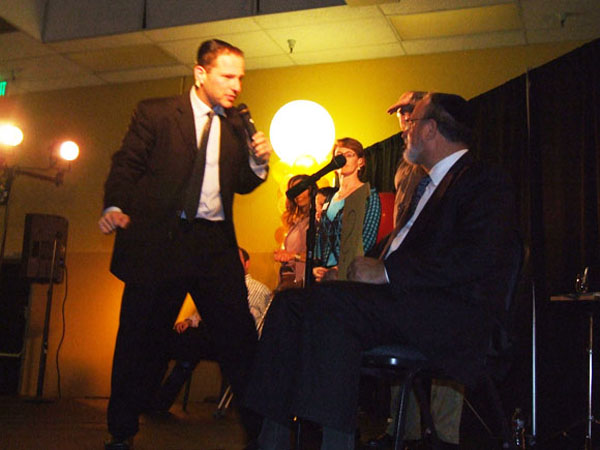
Mentalist Guy Bavli tells Rabbi Simcha Weiser not to give him the envelope
THE JEWISH CITIZEN
TV Phenomenon personality materializes at Soille San Diego Hebrew Day fundraiser
By Donald H. Harrison
 SAN DIEGO--Several hundred family members and staff of Soille San Diego Hebrew Day School on Saturday evening, Nov. 17, experienced student-like excitement over seeing and learning some things they never would have believed were possible—if they hadn’t seen them with their own eyes. SAN DIEGO--Several hundred family members and staff of Soille San Diego Hebrew Day School on Saturday evening, Nov. 17, experienced student-like excitement over seeing and learning some things they never would have believed were possible—if they hadn’t seen them with their own eyes.
Guy Bavli, a mentalist who will compete in the finale of NBC Television’s Phenomenon program this coming Wednesday night, demonstrated at the school’s “Simcha” fundraiser some of the feats that he has performed
Donald H. Harrison
throughout the world, including his native Israel and his adopted country of the United States.
For example, he blindfolded himself and identified objects a volunteer took from members of the audience. While still blindfolded, he played tic-tac-toe on a slate board with an audience member—and won.
He had volunteers flip through the pages of books, stop at random spots, and then, from across the stage, he told them words on the top line of the pages that they were reading.
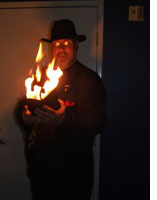 He had a woman close her eyes and then passed his hands over and under hers, his hands never touching hers. Then he asked her to open her eyes and say how many times she had been touched. “Seven,” she declared. Bavli asked the audience to say out loud how many times she actually had been touched. “Zero!” audience members yelled back en masse. The woman was amazed. He had a woman close her eyes and then passed his hands over and under hers, his hands never touching hers. Then he asked her to open her eyes and say how many times she had been touched. “Seven,” she declared. Bavli asked the audience to say out loud how many times she actually had been touched. “Zero!” audience members yelled back en masse. The woman was amazed.
He also had volunteers hold spoons which, he confidently foretold, would grow warm and bend in response to their combined mental energy.
(
The art of spoon- bending is a genre for which Bavli’s boyhood hero, Israeli
Magic Mike Stilwell
mentalist Uri Geller, is most famous for. Currently, Geller is a co-commentator with Chris Angel on Phenomenon. and in last week’s episode, contestant Bavli not only decided to bend spoons but also to try to take the master's trick to a higher level. He brought out a stop sign which he instructed the audience to focus their thoughts on to help him bend it on live television. Bend it did.)
Whether Bavli actually accomplished all that he said—or just seemed to—was a matter of good natured debate after the Soille San Diego Hebrew Day School performance, but regardless of which side people took, there seemed to be general agreement that his show moved quickly, entertainingly, mystifyingly and with plenty of good humor.
Rabbi Simcha Weiser, headmaster of the Orthodox school, introduced Bavli as a “mentalist,” which is the word used to describe that field of magic that focuses on reading other people’s minds, predicting what other people will say or do, and projecting mental power to affect inanimate objects.
The rabbi said that hearing the word “mentalist” reminded him of a time when he was a boy and he first heard the word “vegetarian,” which was explained to him as “someone who eats vegetables.” Later that day, he said, he was quite scared when he was introduced to someone who was described as a “humanitarian.”
Was the rabbi making a joke or was he cautioning the audience not to leap to conclusions?
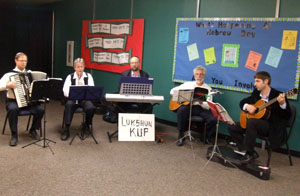 Later in the evening, Bavli, describing Weiser as a “responsible” person, had him sit in a chair and hold a mysterious envelope, emblazoned with a question mark. No matter how many times he asked for the envelope, he pleaded with the rabbi, don’t give it to him, just say no. Thereafter, throughout the act, Bavli asked for the envelope and the rabbi good-naturedly refused, emphasizing the fact that the envelope was in the rabbi’s custody the entire time. Later in the evening, Bavli, describing Weiser as a “responsible” person, had him sit in a chair and hold a mysterious envelope, emblazoned with a question mark. No matter how many times he asked for the envelope, he pleaded with the rabbi, don’t give it to him, just say no. Thereafter, throughout the act, Bavli asked for the envelope and the rabbi good-naturedly refused, emphasizing the fact that the envelope was in the rabbi’s custody the entire time.
In conjunction with this, members of the audience
Lukshun Kup performed before the stage show
had been brought upon stage. They passed books among themselves, held them up, and from the audience, a woman pointed to a book among them that she wanted used. Its title: Jewish American Literature.
A youngster, attending the show with his parents, picked a card from a deck with the name of a food – chicken soup.
Three other members of the audience wrote three digit numbers and a man on stage added them up to 1,652.
A woman was asked to think of a famous person. She chose actor Jimmy Stewart.
And another participant was asked to read from Jewish American Literature the first line from any page and, with some embarrassment, she read: “over his eyes..over his chest.”
Weiser, still guarding the envelope, was asked then to withdraw the paper and to read its contents. As a finale to Bavli’s performance, Weiser read all the answers … 1652 … Jimmy Stewart… chicken soup… Jewish American Literature…. ‘Over his eyes, over his head.’”
The mentalist performed on a stage that was angled in such a way as to be visible to a crowd in an L-shaped configuration, or perhaps, at Soille San Diego Hebrew Day School, it should be referred to as a Dalet-shaped configuration. The stage was decorated with columns of gold and transparent balloons, designed by balloon artist and school parent Sandi Masori and executed by her husband, Shahar Masori. Their 6-year-old son, Shor, is a first-grader, and infant son, Sky, is a pre-schooler at Soille.
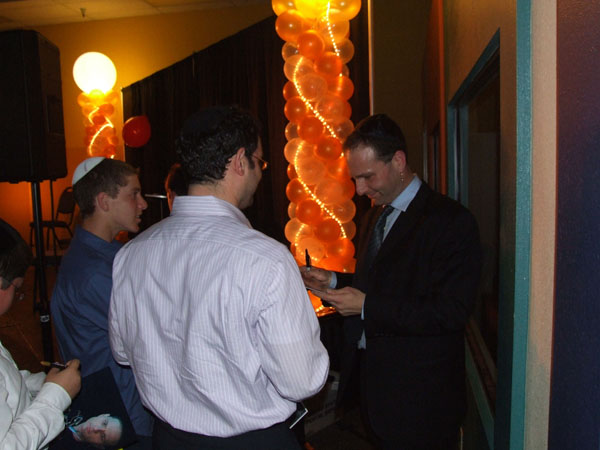
Fan at left with publicity photo of Guy Bavli waits for the mentalist, at right, to autograph it following his show at Soille Sna Diego Hebrew Day School
Sandi Masori, who is my daughter and works as the front-desk receptionist at the school, once had assisted Bavli in Israel, where he subsequently arranged for her to perform solo at parties, school events and on national television.
Another parent with a connection to Bavli was James Whittington, owner of Biophase Solutions, a company that places chemists and technicians on temporary assignment in laboratories. He had been retained by NBC for a recent episode of the Phenomenon television show in which Bavli performed. In that episode, Bavli had to choose the one glass containing water suitable to drink from an array of glasses that contained acid. Whittington, a chemist, was assigned the task of verifying that all the glasses except one indeed contained acid. Bavli, after pushing aside glass after glass of acid, chose and drank one containing water.
Whittington said he had never met Bavli before that night’s television performance, nor had he realized that Bavli later would be headlining the event at the school of his two daughters, Riva and Batya.
Iris Loebenstein chaired Simcha 2007, at which long-time school parent Philip Silverman conducted drawings for a variety of prizes, including a pair of first-class tickets to anywhere in the United States and a $1,000 voucher for a hotel and a car. As it turned out, Silverman, himself, was the grand prize winner.
Prior to the stage show, Magic Mike Stillwell, a San Diego-based close-up magician, performed at people’s tables. A band, Lukshun Kup, played Hebrew and Yiddish melodies.
Harrison is the editor and publisher of San Diego Jewish World
< BACK TO TOP


HONORABLE MENSCHEN IN SPORTS
Is Ryan Braun baseball's first Jewish rookie of the year? It depends...
By Joe Naiman
LAKESIDE, California—Baseball has had Jewish players win the Most Valuable Player award, specifically Hank Greenberg and Al Rosen. Sandy Koufax won the Cy Young Award three times in an era before separate awards were given for each league. Now Ryan Braun may have become the first Jewish player to earn Rookie of the Year honors.
Braun's credentials as Rookie of the Year are more solid than his credentials as a Jew. Under Jewish law, known as Halacha, for one to be Jewish, one must have a Jewish mother or convert to Judaism. Under Jewish law the child of a mixed marriage is the religion of the mother. Braun's father is Jewish, but his mother is not.
The Reform movement recognizes as Jewish those children of mixed marriages whose fathers are Jewish if the children identify as Jews and participate in temple life.
Eligibility for the Maccabi games officially is stated by the JCC as follows: "... Maccabi Games athletes must be Jewish. Jewish is defined as the following: the athlete's mother is Jewish or the athlete is a convert to Judaism; if the father is the only Jewish parent, the athlete is eligible if he/she has been brought up Jewish. In the athlete's registration confirmation kit, there is a declaration that contains the aforementioned eligibility requirements; both the athlete and his/her parents must sign this declaration."
So by that standard 2002 Olympic figure skating gold medalist Sarah Hughes, who has a Jewish mother and a non-Jewish father, would automatically qualify in the Maccabi games whereas baseball executive Mike Port, who, like Braun, has a Jewish father and a non-Jewish mother, would have to sign a declaration that he was brought up Jewish.
There's a difference, however, between the policies of the Maccabi games and those of the San Diego Jewish World with regard to inclusiveness. Under this publication's guidelines about people we cover as Jews, I have a little more leeway. That's not due to my own initiative to bring aboard a Gentile due to his strong baseball skills, the way certain religious colleges overlook faith when an athlete is involved. The precedent came with the invitation that publisher and editor Don Harrison extended to me to write this column.
Harrison is an identified Jew. I'll declare my Jewish ancestry to my Catholic friends, but other than attending an occasional Passover seder my active Jewishness pretty much consists of drinking bottles of Manischewitz. Rather than mislead anybody by referring to myself as a Jew, I note that I am of Jewish descent.
According to Harrison's formulation, anyone with a Jewish parent is a member of the greater Jewish community and thus of Jewish interest to this publication. Harrison leaves the narrower question of whether that person is religiously a Jew to rabbis.
Meanwhile, official criteria for a batting title deprived Braun of a position among the National League's batting leaders due to his failure to meet the requirement of 502 plate appearances by a mere ten trips to the plate. Braun began the season in the minor leagues before being promoted to the Milwaukee Brewers on May 25. In other words, his 34 home runs and 97 runs batted in occurred
in just over two-thirds of a season.
By the way, there's a clause regarding the batting average qualification. Although 3.1 plate appearances per scheduled game (meaning 502 in a 162-game season) are required to
qualify for the batting title, if a player were to go hitless in enough theoretical appearances to bring his plate appearance total to the minimum and still finish with a higher batting average than the closest qualified player, he is awarded the batting title with his actual average. In major league
history this has been invoked only once, with Tony Gwynn in 1996.
With Ryan Braun, it can be used to give him the slugging percentage record for a major league rookie. Braun had a slugging percentage of .634, which exceeded the previous major league record of .618 set by Mark McGwire in 1987. The previous National League record was .614, set in 1930 by Wally Berger.
Berger's 1930 season also included 38 home runs, which was the record for a rookie until it was tied in 1956 by Frank Robinson and broken by McGwire in 1987. It still stands as a National League record, in conjunction with Robinson's share of that record. When Braun's 34 minor
league games with Nashville are added to his 113 games with the Brewers, he hit 44 home runs while driving in 119 runs.
There's another Jewish connection in that record, by the way. McGwire broke Al Rosen's American League record, which had stood at the 37 homers Rosen hit in 1950. And if you're wondering, Walt Dropo beat out Rosen for Rookie of the Year honors that season.
Braun also had 26 doubles and six triples with Milwaukee and scored 91 runs. He stole 15 bases with the Brewers and another four in the minors.
Depending on your view of whether Halacha should apply, Braun may not truly qualify as the first Jewish Rookie of the Year, but he definitely proved himself worthy of the National League Rookie of the Year honor which was bestowed upon him last Monday.
Braun probably identifies with Judaism more than many Americans, and even many professional athletes, who actually meet the halachic description of being Jewish. He might not be
suitable to be a rabbi, but he's on his way to being a Jewish baseball star.



SAN DIEGO JEWISH WORLD THE WEEK IN REVIEW
SUNDAY, NOVEMBER 18
Shoshana Bryen in Washington, D.C.: Every veteran is Hal's best Koster-mer; JINSA backs him for citizen's award
Cynthia Citron in Los Angeles: Lessons assures that audience learns too
Rabbi Baruch Lederman in San Diego: 'Pearing' our perceptions and reality
Rabbi Leonard Rosenthal in San Diego: Notice Divine presence all around us
FRIDAY-SATURDAY, NOVEMBER 16-17
Donald H. Harrison in San Diego: Beau's Geste: Student gives up bar mitzvah money so others kids can have a school
Ira Sharkansky in Jerusalem: Jewish shtetl mentality is understandable
but dangers to Jews often exaggerated
David Strom in San Diego: The saga of a Muslim woman seeking a modern life that her society would deny
THURSDAY, NOVEMBER 15
Shoshana Bryen in Washington D.C.: Parsing Secretary Rice's Mideast outlook
Joel and Arlene Moskowitz in La Jolla: Two centuries of U.S.-Muslim conflict dissected by author Michael B. Oren
Fred Reiss in Winchester, California: Fictional rabbi become a detective— as if her life wasn't already crazy enough
Dorothea Shefer-Vanson in Eilat, Israel: The joy of wintering on Israel's Riviera
Isaac Yetiv in La Jolla: Two myths will color Annapolis confab: "occupation" and "illegal settlements"
WEDNESDAY, NOVEMBER 14
Garry Fabian in Melbourne, Australia: Former Labor prime minister slams Liberals' pot shot about Israel .... Stark memories of Kristallnacht
Gaylene Fisch in Solana Beach, California: KLS: A rare syndrome affecting Ashkenazi families for which there is no known cure
Gerry Greber in Solana Beach, California: Baptist minister shares 35 years of Israeli memories with Women's Ort lunch group
Donald H. Harrison in San Diego: Strolling through the knotty questions of inter-religious and inter-Jewish relations
Sheila Orysiek in Costa Mesa, California: Tango's repetitive dance moves and lack of color in costuming can tire audiences
Dorothea Shefer-Vanson in Eilat, Israel: The quieter voices at Israel's playground
TUESDAY, NOVEMBER 13
Shoshana Bryen in Washington, D.C.: Army officer reflects on Veteran's Day about his assignment in the Iraq war
Mitchell Finkel in North Bethesda, Maryland: Why Abbas as peacemaker is unbelievable
Peter Garas in Gordon, Australia: Colonialism the culprit in Pakistan and elsewhere in unstable world
Donald H. Harrison in San Diego: Dreams Imagined by Freud Descendant
Michoel Stern in Monsey, New York: What about extending tolerance to the Orthodox members of your family?
Lynne Thrope in San Diego: Culinary stars gather for San Diego Bay Wine and Food Festival
< BACK TO TOP
|
|

